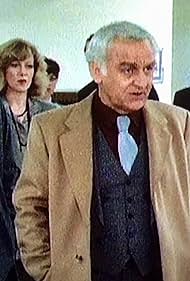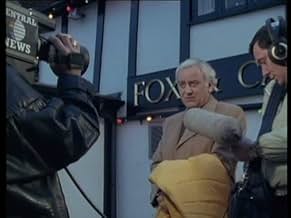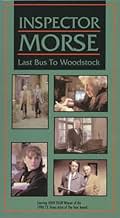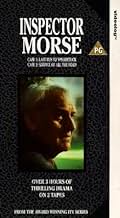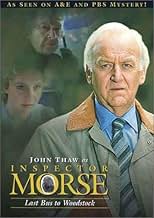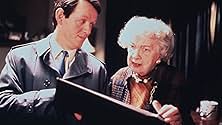Last Bus to Woodstock
- El episodio se emitió el 22 mar 1988
- TV-14
- 1h 43min
PUNTUACIÓN EN IMDb
7,7/10
964
TU PUNTUACIÓN
Añade un argumento en tu idiomaA young blonde hitches a late lift from a bus stop and ends up dead in a pub car park.A young blonde hitches a late lift from a bus stop and ends up dead in a pub car park.A young blonde hitches a late lift from a bus stop and ends up dead in a pub car park.
- Dirección
- Guión
- Reparto principal
Reseñas destacadas
10grantss
The best Morse episode to that point. Everything just gels so well here. There's none of the clumsiness of the first season, the pointless sub-plots that were also a feature of the early stuff or the ridiculously complex plot of the previous episode. It's as if the writers tinkered with the formula until they got it right and this is the one whre it happened.
There's a fair amount of intrigue: a young woman murdered in a parking lot, a cryptic note in her posession, a host of seemingly unconnected individuals living their lives. The seemingly unconnected individuals add another layer in that their mini-stories are quite interesting. The young English student was wonderfully enchanting with her intelligence and boundless energy.
Another great character was the old lady who witnessed the red car. Great value as she showed Morse and Lewis how to do policework.
All these interesting little sub-plots and colourful characters make for a very engaging episode.
There's a fair amount of intrigue: a young woman murdered in a parking lot, a cryptic note in her posession, a host of seemingly unconnected individuals living their lives. The seemingly unconnected individuals add another layer in that their mini-stories are quite interesting. The young English student was wonderfully enchanting with her intelligence and boundless energy.
Another great character was the old lady who witnessed the red car. Great value as she showed Morse and Lewis how to do policework.
All these interesting little sub-plots and colourful characters make for a very engaging episode.
Loved this one. Apart from a very silly plot point involving a coded letter found on the victim Last Bus To Woodstock is classic Morse. At this point it felt like the muder rate in Oxford was topping Los Angeles, but the scene where Morse visits the three female housemates is wonderful. He really should stop trying to get off with murder suspects, though!
Shame this was Peter Woodthorpe's last episode. As the gravelly but darkly humorous Max he was always a delight, Almost as fruity as he was in Evil of Frankenstein!
Shame this was Peter Woodthorpe's last episode. As the gravelly but darkly humorous Max he was always a delight, Almost as fruity as he was in Evil of Frankenstein!
"You're going to like this one. Quite a puzzle", says Max in this adaptation of Colin Dexter's first novel. Quite right: A girl is dead, and in her purse is a mysterious envelope, empty but for a coded letter, reading "Take this, please."
One of the best Morse episodes, Last Bus to Woodstock has a plot that twists and turns, keeping both Morse and the viewer stumped until the last moment, when the dreadful truth sinks in.
Gender roles and loneliness are the recurring themes that serve as the foundation for this visit to Oxford: Among the dozens of characters introduced, all but two live hauntingly lonely lives, coping as they may -- through drinking, gambling, sex and adultery.
The first exception is an old miss Marple type. She has learned to deal with the loneliness, or even appreciate it. The second exception is Angie, a young and amiable English literature student, who has yet to face the harsh facts of life. Of course, her innocence can't last, and eventually she gets her unpleasant rite of passage into adulthood.
As often with Morse, the conclusion is only half satisfying: Although the case is closed, there's no sense of justice being fulfilled, only lives ruined, a little more misery in an already miserable world. The Inspector Morse series never drew the nicest picture of society, but in this episode, it seems particularly grim.
One of the best Morse episodes, Last Bus to Woodstock has a plot that twists and turns, keeping both Morse and the viewer stumped until the last moment, when the dreadful truth sinks in.
Gender roles and loneliness are the recurring themes that serve as the foundation for this visit to Oxford: Among the dozens of characters introduced, all but two live hauntingly lonely lives, coping as they may -- through drinking, gambling, sex and adultery.
The first exception is an old miss Marple type. She has learned to deal with the loneliness, or even appreciate it. The second exception is Angie, a young and amiable English literature student, who has yet to face the harsh facts of life. Of course, her innocence can't last, and eventually she gets her unpleasant rite of passage into adulthood.
As often with Morse, the conclusion is only half satisfying: Although the case is closed, there's no sense of justice being fulfilled, only lives ruined, a little more misery in an already miserable world. The Inspector Morse series never drew the nicest picture of society, but in this episode, it seems particularly grim.
Last Bus to Woodstock is one of the best Morse episodes,, certainly my favorite episode of season two. It gets the balance just right. Morse is at his most courteous - there's plenty of Lewis and Max (unfortunately, this is Max's last episode) - there's talk about religion, literature, sex, love, all the stuff we love about the show. It also manages to be reasonably coherent; I could keep up with the characters; the conclusion only had one out-of-place coincidence.
There are a few men, but the focus is really on the splendid female characters, from Fabia Drake, above, as the lovely, lovely Mrs. Jarman (this terrific sequence is exactly what would happen if Marple met Morse - and come to think of it, that's a series crossover that really should happen) to Holly Aird as Angie Hartmann, a young woman who shares Morse's love of literature.
Morse has lots of good conversations with interesting women, but doesn't date any of them, interestingly. (I understand this was not the case in the book.) Relationships (as noted in this review) tend to be shown in a very poor light - and Morse is about the only positive male character. The theme is most blatant in a scene in which Morse lectures Lewis for adopting a proprietorial tone towards Valerie: "I don't want to own anyone." Could a relationship based not on possession but on love be the answer? Is that even possible? The question is left hanging.
For more detective reviews: http://www.longish95.blogspot.com/p/the- detectives.html
There are a few men, but the focus is really on the splendid female characters, from Fabia Drake, above, as the lovely, lovely Mrs. Jarman (this terrific sequence is exactly what would happen if Marple met Morse - and come to think of it, that's a series crossover that really should happen) to Holly Aird as Angie Hartmann, a young woman who shares Morse's love of literature.
Morse has lots of good conversations with interesting women, but doesn't date any of them, interestingly. (I understand this was not the case in the book.) Relationships (as noted in this review) tend to be shown in a very poor light - and Morse is about the only positive male character. The theme is most blatant in a scene in which Morse lectures Lewis for adopting a proprietorial tone towards Valerie: "I don't want to own anyone." Could a relationship based not on possession but on love be the answer? Is that even possible? The question is left hanging.
For more detective reviews: http://www.longish95.blogspot.com/p/the- detectives.html
Other reviewers love this episode but I had to watch the first half twice just to get the characters straight. Morse only has two hours to solve the crime so I guess he's entitled to some miraculous guesses but he left me baffled at his technique. Then again, maybe I'm too dense to follow the train of logic he employs. One other irritating point: what happens to the confused characters Morse runs into during the show? The episode so thoroughly examines their lives--such as the two lovers at the victim's place of business--that I expected either some resolution of their problems or a showing of their continued despair. As it is, they were basically left on the cutting room floor. Despite my objections, I say watch the show and appreciate the moving depiction of the often depressing state of human relations that fascinate Morse and his fans.
Argumento
¿Sabías que...?
- CuriosidadesThis is the last episode featuring Peter Woodthorpe as pathologist Max.
- PifiasAt the beginning after examining the body Dr. DeBryn removes his gloves from the outside instead of the usual inside-out manner used by medical professionals. He would have contaminated his hands by removing his gloves in this fashion.
- Citas
[talking about deathbed confessions]
Chief Inspector Morse: The church loves a repentant sinner. Good for business.
- Créditos adicionalesVass Anderson is credited as Mr Bently but addressed as Mr Gill (Hardware shop owner).
- Banda sonoraCosì fan tutte
Composed by Wolfgang Amadeus Mozart
Selecciones populares
Inicia sesión para calificar y añadir a tu lista para recibir recomendaciones personalizadas
Detalles
- Fecha de lanzamiento
- País de origen
- Sitio oficial
- Idioma
- Localizaciones del rodaje
- Empresas productoras
- Ver más compañías en los créditos en IMDbPro
Contribuir a esta página
Sugerir un cambio o añadir el contenido que falta
